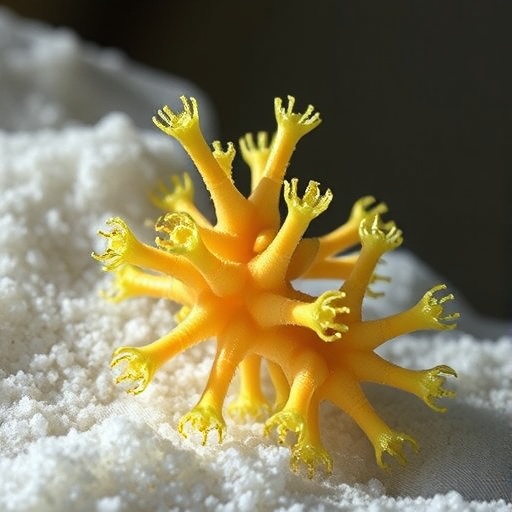In an intriguing advance for crop science, researchers, including Yan et al., have unveiled a new sugar transporter known as MrSTP20 that plays a significant role in how apple rootstocks react to high-salt stress and induction through hexoses. This collective discovery has the potential not only to reshape our understanding of plant responses to saline environments but also to innovate methodologies for enhancing the stress resilience of apple crops, especially in areas increasingly impacted by climate change and unsustainable agricultural practices.
Rootstocks are critical for the survival and productivity of cultivated apple trees, particularly in challenging environmental conditions. The Malus robusta Rehd species has emerged as a promising candidate for horticulturists aiming to develop apple varieties that can withstand elevated salinity levels and other environmental stresses. The MrSTP20 transporter operates vital functions in regulating sugar transport within the plant, providing promising avenues for agricultural improvements.
The elucidation of the MrSTP20 transporter highlighted its role as a messenger connecting hexose-induced signaling pathways to physiological adaptations in Malus robusta. Sugar transporters function as conduits for assimilated sugars throughout the plant’s vascular system, and their proper functioning is essential for growth and stress responses. The relevance of understanding these transporters is compounded by the escalating salinity issues many crops face due to irrigation mismanagement and rising sea levels.
This comprehensive study utilized a combination of genetic, biochemical, and physiological analyses to determine the operability of MrSTP20 under salinity stresses and in response to hexose concentration increases. By systematically analyzing the transporter’s expression patterns through various stages of salt exposure, researchers found that MrSTP20 is upregulated in response to harsh saline conditions. This discovery opens the door to potentially engineering apple varieties that have heightened thresholds for salinity tolerance.
Investigating the interactions between MrSTP20 and other signaling molecules, the research team characterized how this transporter regulates cellular responses at the molecular level. The findings suggest that when malus rootstocks experience high-salt conditions, MrSTP20 aids in the redistribution of sugars, thus facilitating enhanced osmotic balance and overall vigor in saline environments. This biochemical nexus underlines an intricate symbiosis between signaling and metabolic pathways within plants.
Additionally, the researchers provided evidence indicating that MrSTP20 does not operate in isolation. The study identified other proteins and genes that interact with MrSTP20, creating an integrated network that responds to stresses efficiently. This multifaceted approach enhances our understanding of the genetic and molecular frameworks that govern plant responses to abiotic stresses, extending our knowledge well beyond mere sugar transport.
The implications of these findings extend beyond the immediate scope of apple cultivation. With the world facing heightened food security concerns due to climate variability, improving our understanding of stress response mechanisms in crops is crucial. MrSTP20 illustrates how genetic adaptations can be harnessed to improve resilience and productivity. Such research could lead to breakthroughs that allow for increased yields and better quality fruit under adverse environmental conditions.
Moreover, the enhanced understanding of sugar transporters can facilitate the development of precision breeding techniques. Instead of relying solely on conventional breeding methods, molecular tools can now be employed to speed up the selection of traits like salt tolerance in apple trees and other crops, ultimately ushering in a new era of agricultural innovations.
Furthermore, with the elucidation of the mechanistic roles of MrSTP20, there is also potential for genetic engineering applications. In the face of global challenges such as soil salinization, engineered crops with enhanced MrSTP20 may possess greater tolerances, ensuring more robust production systems. This knowledge not only benefits apple cultivators but also has broader ramifications for similar fruit crops needing resilience to salinity, illustrating the interconnectedness of agricultural science.
As climate change continues to impose unprecedented pressures on agriculture, the importance of research such as this cannot be overstated. Enhancing the resilience of crop plants through understanding mechanisms like the one presented with MrSTP20 can significantly impact sustainable agriculture practices and food systems worldwide.
In conclusion, the identification and characterization of the MrSTP20 transporter highlight a critical area of exploration in plant genomics and physiology. By advancing our comprehension of how sugar transporters function in response to stress, we pave the way for developing practical solutions to some of the most pressing agricultural challenges of our time. This work not only enriches our theoretical knowledge but also serves as a beacon for future research directions aimed at fostering more sustainable and resilient agricultural practices.
In summary, as the agricultural landscape transforms under the pressures of climate change, identifying transporters like MrSTP20 offers a promising avenue toward fostering resilience in essential crops. Innovative solutions derived from this research could safeguard food production and enhance crop adaptability, positioning scientists at the forefront of addressing food security in a volatile environmental future.
Subject of Research: Identification of sugar transporter MrSTP20 responding to high-salt stress and hexoses induction in apple rootstock.
Article Title: Identification of sugar transporter MrSTP20 responding to high-salt stress and hexoses induction in apple rootstock (Malus robusta Rehd).
Article References:
Yan, YL., Shi, TL., Zhou, J. et al. Identification of sugar transporter MrSTP20 responding to high-salt stress and hexoses induction in apple rootstock (Malus robusta Rehd).
BMC Genomics 26, 860 (2025). https://doi.org/10.1186/s12864-025-12062-2
Image Credits: AI Generated
DOI: 10.1186/s12864-025-12062-2
Keywords: sugar transporter, MrSTP20, high-salt stress, hexose induction, apple rootstock, Malus robusta, resilience, salinity tolerance, crop science, plant genomics.
Tags: agricultural practices sustainabilityapple rootstocks salt stressclimate change agricultureenhancing crop stress resiliencehexose signaling pathwayshorticultural innovationsMalus robusta resilienceMrSTP20 sugar transporterphysiological adaptations in plantssaline environment adaptationsugar transport regulationsugar transporters in plants





